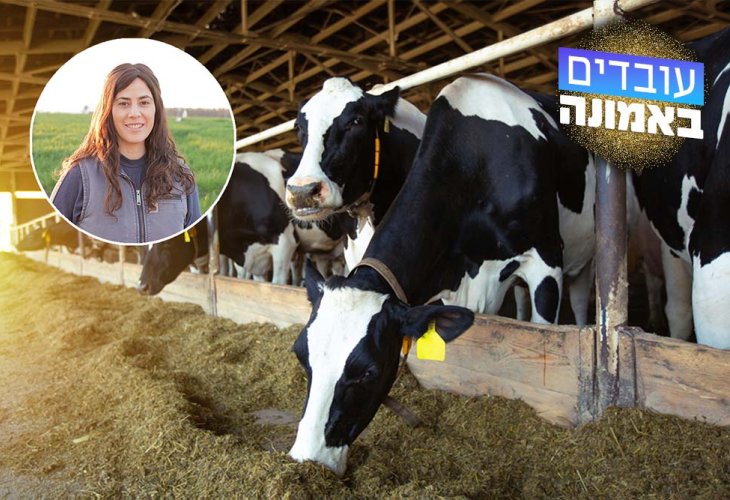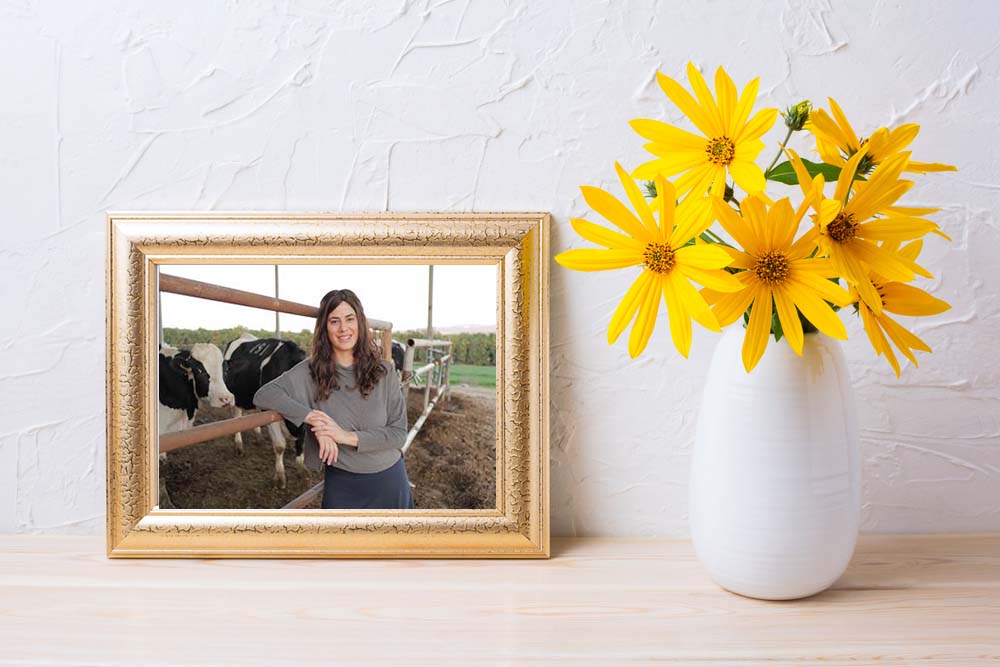In the Barn, with a Wig and Skirt: The Unique Job of Sivan Laker-Rosenfeld
Sivan Laker-Rosenfeld leads an Ultra-Orthodox lifestyle, her husband teaches in a Talmud Torah, and they have two children. Yet, her profession might surprise you: she's a veterinarian advancing animal welfare in barns. What led her to this, and how does her becoming more religious connect to the story?
 In the circle: Sivan Laker-Rosenfeld (Photo: shutterstock)
In the circle: Sivan Laker-Rosenfeld (Photo: shutterstock)When Sivan Laker-Rosenfeld enters the barn, wearing a skirt and a wig, even the cows seem surprised. Sivan is a veterinarian by profession, who, a few years ago, established a unique initiative called "Conscious Dairy Farming" aimed at improving cow welfare in barns. A job definitely not ordinary for a woman, especially one who observes mitzvot.
"I live in Ramat Yishai," she shares, "and I've essentially grown up in the area since I was born. I've always been connected to animals and knew I wanted to work in a field that involves caring for them."
Naturally, she pursued veterinary studies, despite them being long and arduous. "To become a veterinarian in Israel, one needs a bachelor's degree in biology or animal sciences, followed by four years of veterinary studies at the Faculty of Agriculture in Rehovot. In total, it's about seven years of studies, all of which I had to go through."
An Answer at the Faculty
Sivan underwent the process of becoming more religious during her studies, which certainly made her life very challenging. "It began when my entire nuclear family underwent a kind of change. My older sister became more religious before me, followed by my mother. I identified with their way of life from the start, but my process was gradual.
"Interestingly, during the intense and very demanding studies at the faculty, I felt an inner need to observe Shabbat. I remember my study mates were quite amazed, as in those days we used every spare moment to study, and it seemed impossible to them to take a break once a week for 25 hours. But for me, it was very natural. Back then, I was also studying Tanya and getting closer to the Chabad movement.
"Additionally, while studying at the faculty, there was a program called 'Tradition' that allowed students to learn about Jewish studies. I enrolled in it, and it greatly enriched me."
Did you ever think of stopping your studies because of the spiritual change you were going through?
"No, it never crossed my mind. It was clear to me that the work would fit into my new life. But when I completed my studies, I could dedicate more time to in-depth Torah study. I decided that alongside starting work, I'd study at Midreshet Beit Shoshana in Tel Aviv. There came the serious stage of strengthening my faith. Later, I married my husband, Tomer, who also became more religious. Initially, he studied at Machon Meir, then continued to Ateret Cohanim, and finally studied at the Ramat Hasharon Yeshiva. Originally, he's from Ramat Yishai, a friend of my brother, who also became more religious."
A Mission Among the Cows
Tell us –what was the biggest challenge for you in the process of becoming religious as someone who turned into an Ultra-Orthodox veterinarian?
"My biggest challenge was at the beginning, when I needed to adjust to changes in the dress code. It was very challenging. I went to work in the field wearing a skirt over my pants and a wig that absorbed the smell of the cows... it wasn't easy, but over time I got used to it."
And how did people around you react to your becoming more religious?
"In this regard, there was no difficulty because from the very beginning, I didn't disconnect from society at all, nor did I see any point in doing so. As someone who belongs to the Chabad movement, where there's a great emphasis on illuminating this world through actions, the change was natural and seamlessly integrated with my life's path. For me, the mission is not to disconnect from those who don't observe Torah and mitzvot or from old friends, but on the contrary, to live in that environment in a religious way, and from there form the connection. I feel this is the best way to influence and spread the light of Judaism."

She applies the same principle in the initiative she established. "At the beginning, I was sure I would open a clinic for dogs and cats, but Hashem had different plans for me. After completing my studies, I began working in the field of developing technologies for dairy farming efficiency. Nowadays, there are many high-tech companies investing in such developments. There are computerized and advanced monitoring systems that can tell you everything you want to know about a cow, like how much milk it gives, how much time it ruminates daily, and more.
"While working in high-tech, I visited barns in Israel and around the world and concluded that there was a need to significantly advance animal welfare in Israel. I saw all the existing developments and research in the field on one hand, but on the other hand, this vast knowledge didn't reach the farmers in a practical way adapted to their daily work.
"As I mentioned earlier – my view of the world isn't about negating it but about working with what's there and improving it. Therefore, I decided to take all the theoretical knowledge and turn it into a practical method for farmers. The foundation of this method is the understanding that if we become aware of how a cow experiences and perceives the world, we can change and adapt our handling of them, creating a calmer and quieter working environment for them and, of course, for the staff. I teach farmers how to raise animals in ways that consider their needs, both physiological and behavioral."
How do you actually do that?
"First, there's the relationship between the milker and the cow. It's important to understand that it's a person who works with them daily, and often it's done loudly and a bit aggressively, unnecessarily. By understanding the cows, their senses, and natural movement, you can lead them quietly and calmly. This makes the cows calmer, and working with them becomes easier. There were barns I visited where, for years, they were led with claps and loud noises, never considering there might be another way.
"Another area I consult on is designing cow pathways and their entry into the milking parlor. Often, the infrastructure is designed without considering the animals and their senses. In this matter as well, I found structural solutions to allow cow movement to flow. I also conduct training in other areas, where I feel I'm helping animal welfare while also aiding farmers. It's a mutual benefit."
Questions in the Barn
How do farm owners react when they discover an Ultra-Orthodox woman is coming to advise them?
"They're less surprised that I'm a woman because there are a few other female veterinarians in the field. But they are definitely surprised that I observe mitzvot. I'm actually glad about it because it always leads to questions. They want to hear when I became religious, and I share and tell them.
"It's important for me to clarify that I never bring up the topic myself, but when they mention it, I'm happy to share. It's interesting to see that these are often people from moshavs and kibbutzim, seemingly quite distant from Judaism, yet many of them truly respect and appreciate it."
Sivan emphasizes that throughout her journey, she is influenced by one of the talks delivered by the Lubavitcher Rebbe about Parashat Noah. "The Rebbe explains that Noah could have just settled for bringing the animals into the ark and felt that by merely fulfilling Hashem's commandment – to keep them alive, he did his part. However, Hashem commanded him not only to save lives but also to build nests and compartments, suitable for each animal and fitting to its nature.
"This is what guides me in my work. I know that my mission isn’t just to ensure the cows stay alive and productive, but also to truly think and care for them. From this, I understood that we are also responsible for adapting barn conditions for the cows and calves. Nowadays, I’m working on a new project of natural raising, where calves aren't separated from their mothers as is customary, but are allowed to grow together. This is something very important for me to promote."
Besides your interesting occupation, you're also a mother. How does this fit with the demanding work?
"Baruch Hashem, I have two small children. My husband works as a teacher, so whenever there are school holidays, we go down to the Arava and Negev together, and perform the training there. The work continues even during pregnancy and after childbirth. There were times I brought the babies with me into the barns. They really know the smells from infancy, it's part of all our lives."

